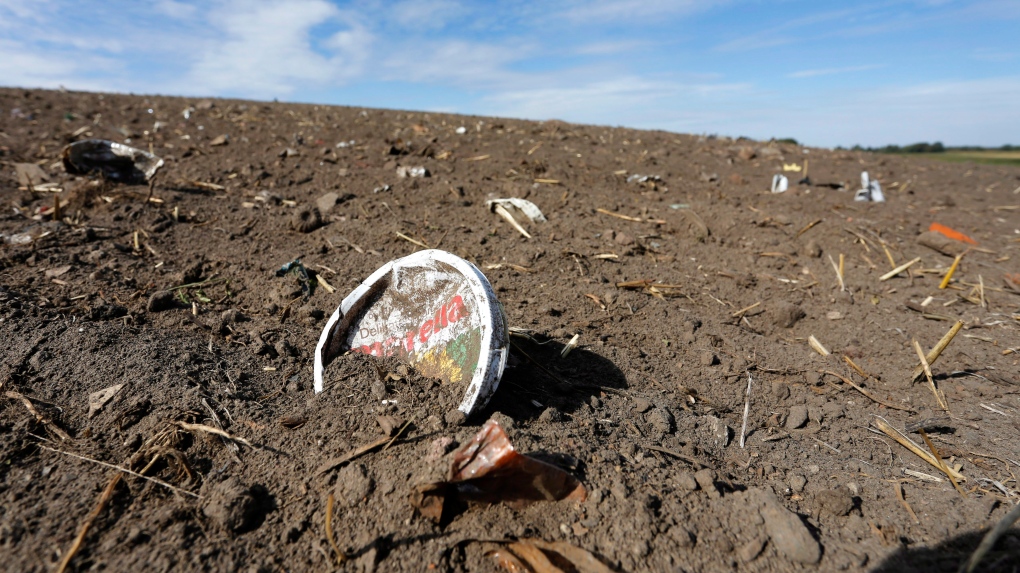
Grandparents killed in wrong-way crash on Hwy. 401 identified
A 60-year-old man and a 55-year-old woman killed in a wrong-way crash on Highway 401 earlier this week have been identified by the Consulate General of India in Toronto.
In recent years, scientists have discovered increasing amounts plastic particles in deep oceans, Arctic snow, drinking water, and even breast milk.
How’s that possible?
The answer lies in nearly 350 million tons of plastic being produced globally each year, and about 250,000 tons of plastic littering our oceans.
Precipitation cycles carry microplastics through the air, scattering them across the planet and situating them within natural food chains that comprise ecosystems. As a result, these durable particles have ended up just about everywhere, and scientists believe they’re not going away anytime soon.
Beyond deriving from plastic debris that has degraded into smaller pieces, microplastics have also been prominent in health and beauty products, such as certain cleansers and toothpastes. Microbeads, a type of microplastic, are a form of polyethylene plastic that easily passes through water filtration systems eventually posing a risk to aquatic life.
A recent study led by Stanford University researchers determined that blue whales consume up to 10 million pieces of microplastic daily, largely through the prey that they eat.
Environment International reported that traces of microplastics were discovered in 80 per cent of blood samples taken from 22 anonymized, healthy humans.
And researchers with Universita Politecnica della Marche found microplastics in 26 of 34 samples of breast milk, all collected from a randomized group of women.
But what are the dangers of all these microplastics?
Scientists don’t yet know. At least not fully.
With some plastic specks small enough to infiltrate cells and tissues, some studies have suggested a correlation to certain cancers and various health problems, especially with microplastics leading to levels of chemical toxicity.
As Nature reports, the potential dangers of ingesting microplastics depends on how quickly these particles travel through the human body – a factor that researchers are only beginning to study.

A 60-year-old man and a 55-year-old woman killed in a wrong-way crash on Highway 401 earlier this week have been identified by the Consulate General of India in Toronto.
Golf is a sign of spring and summer and a major driver for seasonal tourism, experts say.
The adorable trio of child actors from the 1993 classic comedy 'Mrs. Doubtfire,' which starred the late and great Robin Williams, are all grown up and looking back on their seminal time together.
The erstwhile group of senators and MPs studying the federal government's invocation of the Emergencies Act over the "Freedom Convoy" was supposed to present its findings in December. December of 2022, that is.
A Quebec man who pleaded guilty to threatening Prime Minister Justin Trudeau and Premier François Legault has been sentenced to 20 months in jail.
A source close to singer Britney Spears tells CNN that the pop star is 'home and safe' after she had a 'major fight' with her boyfriend on Wednesday night at the Chateau Marmont in West Hollywood.
TD Bank Group could be hit with more severe penalties than previously expected, says a banking analyst after a report that the investigation it faces in the U.S. is tied to laundering illicit fentanyl profits.
Three people have been arrested and charged in the killing of B.C. Sikh activist Hardeep Singh Nijjar – as authorities continue investigating potential connections to the Indian government.
As Wegovy becomes available to Canadians starting Monday, a medical expert is cautioning patients wanting to use the drug to lose weight that no medication is a ''magic bullet,' and the new medication is meant particularly for people who meet certain criteria related to obesity and weight.

Alberta Ballet's double-bill production of 'Der Wolf' and 'The Rite of Spring' marks not only its final show of the season, but the last production for twin sisters Alexandra and Jennifer Gibson.
A British Columbia mayor has been censured by city council – stripping him of his travel and lobbying budgets and removing him from city committees – for allegedly distributing a book that questions the history of Indigenous residential schools in Canada.
Three men in Quebec from the same family have fathered more than 600 children.
A group of SaskPower workers recently received special recognition at the legislature – for their efforts in repairing one of Saskatchewan's largest power plants after it was knocked offline for months following a serious flood last summer.
A police officer on Montreal's South Shore anonymously donated a kidney that wound up drastically changing the life of a schoolteacher living on dialysis.
Since 1932, Montreal's Henri Henri has been filled to the brim with every possible kind of hat, from newsboy caps to feathered fedoras.
Police in Oak Bay, B.C., had to close a stretch of road Sunday to help an elephant seal named Emerson get safely back into the water.
Out of more than 9,000 entries from over 2,000 breweries in 50 countries, a handful of B.C. brews landed on the podium at the World Beer Cup this week.
Raneem, 10, lives with a neurological condition and liver disease and needs Cholbam, a medication, for a longer and healthier life.
 In this Sept. 9, 2018 photo plastic waste sits on a freshly cultivated field in Nauen, Germany. (AP Photo/Ferdinand Ostrop)
In this Sept. 9, 2018 photo plastic waste sits on a freshly cultivated field in Nauen, Germany. (AP Photo/Ferdinand Ostrop)